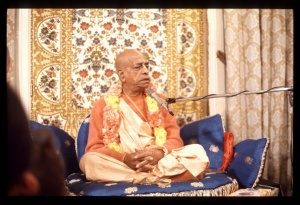SB 6.14.6: Difference between revisions
No edit summary |
(Vanibot #0054 edit - transform synonyms into clickable links, which search similar occurrences) |
||
| Line 23: | Line 23: | ||
<div class="synonyms"> | <div class="synonyms"> | ||
''vṛtraḥ'' | ''[//vanipedia.org/wiki/Special:VaniSearch?s=vṛtraḥ&tab=syno_o&ds=1 vṛtraḥ]'' — Vṛtrāsura; ''[//vanipedia.org/wiki/Special:VaniSearch?s=tu&tab=syno_o&ds=1 tu]'' — but; ''[//vanipedia.org/wiki/Special:VaniSearch?s=saḥ&tab=syno_o&ds=1 saḥ]'' — he; ''[//vanipedia.org/wiki/Special:VaniSearch?s=katham&tab=syno_o&ds=1 katham]'' — how; ''[//vanipedia.org/wiki/Special:VaniSearch?s=pāpaḥ&tab=syno_o&ds=1 pāpaḥ]'' — although sinful (getting the body of a demon); ''[//vanipedia.org/wiki/Special:VaniSearch?s=sarva&tab=syno_o&ds=1 sarva]-[//vanipedia.org/wiki/Special:VaniSearch?s=loka&tab=syno_o&ds=1 loka]'' — of all the three worlds; ''[//vanipedia.org/wiki/Special:VaniSearch?s=upatāpanaḥ&tab=syno_o&ds=1 upatāpanaḥ]'' — the cause of suffering; ''[//vanipedia.org/wiki/Special:VaniSearch?s=ittham&tab=syno_o&ds=1 ittham]'' — such; ''[//vanipedia.org/wiki/Special:VaniSearch?s=dṛḍha&tab=syno_o&ds=1 dṛḍha]-[//vanipedia.org/wiki/Special:VaniSearch?s=matiḥ&tab=syno_o&ds=1 matiḥ]'' — firmly fixed intelligence; ''[//vanipedia.org/wiki/Special:VaniSearch?s=kṛṣṇe&tab=syno_o&ds=1 kṛṣṇe]'' — in Kṛṣṇa; ''[//vanipedia.org/wiki/Special:VaniSearch?s=āsīt&tab=syno_o&ds=1 āsīt]'' — there was; ''[//vanipedia.org/wiki/Special:VaniSearch?s=saṅgrāme&tab=syno_o&ds=1 saṅgrāme] [//vanipedia.org/wiki/Special:VaniSearch?s=ulbaṇe&tab=syno_o&ds=1 ulbaṇe]'' — in the great blazing fire of battle. | ||
</div> | </div> | ||
Latest revision as of 22:30, 18 February 2024

A.C. Bhaktivedanta Swami Prabhupada
TEXT 6
- vṛtras tu sa kathaṁ pāpaḥ
- sarva-lokopatāpanaḥ
- itthaṁ dṛḍha-matiḥ kṛṣṇa
- āsīt saṅgrāma ulbaṇe
SYNONYMS
vṛtraḥ — Vṛtrāsura; tu — but; saḥ — he; katham — how; pāpaḥ — although sinful (getting the body of a demon); sarva-loka — of all the three worlds; upatāpanaḥ — the cause of suffering; ittham — such; dṛḍha-matiḥ — firmly fixed intelligence; kṛṣṇe — in Kṛṣṇa; āsīt — there was; saṅgrāme ulbaṇe — in the great blazing fire of battle.
TRANSLATION
Vṛtrāsura was situated in the blazing fire of battle and was an infamous, sinful demon, always engaged in giving troubles and anxieties to others. How could such a demon become so greatly Kṛṣṇa conscious?
PURPORT
It has been described that a nārāyaṇa-parāyaṇa, a pure devotee, is rarely found even among millions and millions of persons. Therefore Parīkṣit Mahārāja was surprised that Vṛtrāsura, whose purpose was to give trouble and anxiety to others, was one of these devotees, even on a battlefield. What was the reason for Vṛtrāsura's advancement?